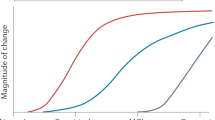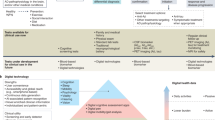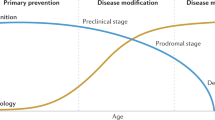Abstract
If we are to find treatments to postpone, reduce the risk of, or completely prevent the clinical onset of Alzheimer disease (AD), we need faster methods to evaluate promising preclinical AD treatments, new ways to work together in support of common goals, and a determination to expedite the initiation and performance of preclinical AD trials. In this article, we note some of the current challenges, opportunities and emerging strategies in preclinical AD treatment. We describe the Collaboration for Alzheimer's Prevention (CAP)—a convening, harmonizing and consensus-building initiative to help stakeholders advance AD prevention research with rigour, care and maximal impact—and we demonstrate the impact of CAP on the goals and design of new preclinical AD trials.
This is a preview of subscription content, access via your institution
Access options
Subscribe to this journal
Receive 12 print issues and online access
$209.00 per year
only $17.42 per issue
Buy this article
- Purchase on Springer Link
- Instant access to full article PDF
Prices may be subject to local taxes which are calculated during checkout
Similar content being viewed by others
References
Alzheimer's Association. 2013 Alzheimer's Disease Facts and Figures. Alzheimers Dement. 9, 208–245 (2013).
Sperling, R. A., Jack, C. R. Jr & Aisen, P. S. Testing the right target and right drug at the right stage. Sci. Transl. Med. 3, 111cm33 (2011).
Reiman, E. M. & Langbaum, J. B. Brain imaging in the evaluation of putative Alzheimer's disease slowing, risk-reducing and prevention therapies. In Imaging the Aging Brain (eds Jagust, W. J. & D'Esposito, M.) 319–350 (Oxford University Press, 2009).
Bateman, R. J. et al. Autosomal-dominant Alzheimer's disease: a review and proposal for the prevention of Alzheimer's disease. Alzheimers Res. Ther. 3, 1 (2011).
Brookmeyer, R., Gray, S. & Kawas, C. Projections of Alzheimer's disease in the United States and the public health impact of delaying disease onset. Am. J. Public Health 88, 1337–1342 (1998).
Reiman, E. M., Langbaum, J. B. & Tariot, P. N. Alzheimer's Prevention Initiative: a proposal to evaluate presymptomatic treatments as quickly as possible. Biomark. Med. 4, 3–14 (2010).
Albert, M. S. et al. The diagnosis of mild cognitive impairment due to Alzheimer's disease: recommendations from the National Institute on Aging and Alzheimer's Association workgroup. Alzheimers Dement. 7, 270–279 (2011).
Sperling, R. A. et al. Toward defining the preclinical stages of Alzheimer's disease: recommendations from the National Institute on Aging and the Alzheimer's Association workgroup. Alzheimers Dement. 7, 280–292 (2011).
McKhann, G. M. et al. The diagnosis of dementia due to Alzheimer's disease: recommendations from the National Institute on Aging and the Alzheimer's Association workgroup. Alzheimers Dement. 7, 263–269 (2011).
Strobel, G. Alzheimer's Prevention Initiative Workshop: scientists and regulators discuss preclinical AD trials. Alzforum [online], (2011).
Strobel, G. Europe–U. S. regulators mull prevention trials in familial AD. Alzforum [online], (2010).
Strobel, G. DIAN grows, gets ready for therapeutic trials. Alzforum [online], (2012).
DeKosky, S. T. et al. Ginkgo biloba for prevention of dementia: a randomized controlled trial. JAMA 300, 2253–2262 (2008).
Vellas, B. et al. Long-term use of standardised ginkgo biloba extract for the prevention of Alzheimer's disease (GuidAge): a randomised placebo-controlled trial. Lancet Neurol. 11, 851–859 (2012).
Shumaker, S. A. et al. Estrogen plus progestin and the incidence of dementia and mild cognitive impairment in postmenopausal women: the Women's Health Initiative Memory Study: a randomized controlled trial. JAMA 289, 2651–2662 (2003).
Shumaker, S. A. et al. Conjugated equine estrogens and incidence of probable dementia and mild cognitive impairment in postmenopausal women: Women's Health Initiative Memory Study. JAMA 291, 2947–2958 (2004).
ADAPT Research Group et al. Cognitive function over time in the Alzheimer's Disease Anti-inflammatory Prevention Trial (ADAPT): results of a randomized, controlled trial of naproxen and celecoxib. Arch. Neurol. 65, 896–905 (2008).
Ball, K. et al. Effects of cognitive training interventions with older adults: a randomized controlled trial. JAMA 288, 2271–2281 (2002).
Yurko-Mauro, K. et al. Beneficial effects of docosahexaenoic acid on cognition in age-related cognitive decline. Alzheimers Dement. 6, 456–464 (2010).
Williamson, J. D. et al. Cognitive function and brain structure in persons with type 2 diabetes mellitus after intensive lowering of blood pressure and lipid levels: a randomized clinical trial. JAMA Intern. Med. 174, 324–333 (2014).
Ngandu, T. et al. A 2 year multidomain intervention of diet, exercise, cognitive training, and vascular risk monitoring versus control to prevent cognitive decline in at-risk elderly people (FINGER): a randomised controlled trial. Lancet 385, 2255–2263 (2015).
Katz, R. Biomarkers and surrogate markers: an FDA perspective. NeuroRx 1, 189–195 (2004).
Bateman, R. J. et al. Clinical and biomarker changes in dominantly inherited Alzheimer's disease. N. Engl. J. Med. 367, 795–804 (2012).
Fleisher, A. S. et al. Associations between biomarkers and age in the presenilin 1 E280A autosomal dominant Alzheimer disease kindred: a cross-sectional study. JAMA Neurol. 72, 316–324 (2015).
Weiner, M. W. et al. The Alzheimer's Disease Neuroimaging Initiative: a review of papers published since its inception. Alzheimers Dement. 8 (1 Suppl.), S1–S68 (2012).
Roses, A. D. et al. New applications of disease genetics and pharmacogenetics to drug development. Curr. Opin. Pharmacol. 14, 81–89 (2014).
Reiman, E. M. et al. Alzheimer's Prevention Initiative: a plan to accelerate the evaluation of presymptomatic treatments. J. Alzheimers Dis. 26 (Suppl. 3), 321–329 (2011).
Crenshaw, D. G. et al. Using genetics to enable studies on the prevention of Alzheimer's disease. Clin. Pharmacol. Ther. 93, 177–185 (2013).
Mills, S. M. et al. Preclinical trials in autosomal dominant AD: implementation of the DIAN-TU trial. Rev. Neurol. (Paris) 169, 737–743 (2013).
Morris, J. C. et al. Developing an international network for Alzheimer research: the Dominantly Inherited Alzheimer Network. Clin. Investig. (Lond.) 2, 975–984 (2012).
Sperling, R. A. et al. The A4 study: stopping AD before symptoms begin? Sci. Transl. Med. 6, 228fs13 (2014).
Donohue, M. C. et al. The Preclinical Alzheimer Cognitive Composite: measuring amyloid-related decline. JAMA Neurol. 71, 961–970 (2014).
Ayutyanont, N. et al. The Alzheimer's Prevention Initiative composite cognitive test score: sample size estimates for the evaluation of preclinical Alzheimer's disease treatments in presenilin 1 E280A mutation carriers. J. Clin. Psychiatry 75, 652–660 (2014).
Langbaum, J. B. et al. An empirically derived composite cognitive endpoint with improved power to track and evaluate treatments for preclinical Alzheimer's disease. Alzheimers Dement. 10, 666–674 (2014).
Saunders, K. T. et al. Arizona Alzheimer's Registry: strategy and outcomes of a statewide research recruitment registry. J. Prev. Alzheimers Dis. 1, 74–79 (2014).
Guidance for industry. Alzheimer's disease: developing drugs for the treatment of early stage disease. Draft guidance. FDA [online], (2013).
Discussion paper on the clinical investigation of medicines for the treatment of Alzheimer's disease and other dementias. European Medicines Agency [online], (2014).
The A4 Study [online], (2014).
US National Library of Medicine. ClinicalTrials.gov [online], (2015).
Doody, R. S. et al. Phase 3 trials of solanezumab for mild-to-moderate Alzheimer's disease. N. Engl. J. Med. 370, 311–321 (2014).
US National Library of Medicine. ClinicalTrials.gov [online], (2015).
Alzheimer's Prevention Registry [online], (2015).
US National Library of Medicine. ClinicalTrials.gov [online], (2015).
Reiman, E. M. et al. Brain imaging and fluid biomarker analysis in young adults at genetic risk for autosomal dominant Alzheimer's disease in the presenilin 1 E280A kindred: a case–control study. Lancet Neurol. 11, 1048–1056 (2012).
Fleisher, A. S. et al. Florbetapir PET analysis of amyloid-β deposition in presenilin 1 E280A autosomal-dominant Alzheimer's disease kindred: a cross-sectional study. Lancet Neurol. 11, 1057–1065 (2012).
DIAN Observational Study [online], (2013).
Moulder, K. L. et al. Dominantly Inherited Alzheimer Network: facilitating research and clinical trials. Alzheimers Res. Ther. 5, 48 (2013).
DIAN-TU Pharma Consortium. Dominantly Inherited Alzheimer Network Trials Unit [online], (2015).
US National Library of Medicine. ClinicalTrials.gov [online], (2015).
TOMMORROW study [online], (2013).
US National Library of Medicine. ClinicalTrials.gov [online], (2015).
Welsh-Bohmer, K. et al. Challenges in international clinical trials to delay early symptomatic Alzheimer's disease. Alzheimers Dement. 9 (Suppl.), P137–P138 (2013).
Acknowledgements
The authors would like to thank Rusty Katz, Laurie Ryan and Neil Buckholtz for their participation in and valuable contributions to the Collaboration for Alzheimer's Prevention. E.M.R. receives research support from the NIH (grants RF1 AG041705, UF1 AG046150, R01 AG031581 and P30 AG19610). J.B.L. and P.N.T. receive research support from the National Institute on Aging (NIA). P.N.T. also receives research support from the Arizona Department of Health Services, and has personal financial interest in California Pacific Medical Center and the Weston Brain Institute. J.C.M. is funded by NIH grants P50 AG005681, P01 AG003991, P01 AG026276 and U19 AG032438. F.L. receives research support from the Anonymous Foundation, Massachusetts General Hospital and the NIH. R.J.B. has received funding from the Alzheimer's Association, the NIH and NIA, and philanthropic foundations. R.A.S. receives research support from the NIA and the Alzheimer's Association. P.S.A. has received research support from the NIH (grants U01 AG10483, U01 AG024904, R01 AG030048 and R01 AG16381).
Author information
Authors and Affiliations
Contributions
E.M.R., J.B.L., P.N.T., R.J.B., J.C.M., R.A.S., P.S.A., A.D.R., K.A.W.-B., M.C.C. and S.W. researched data for the article, made substantial contributions to discussions of the content and wrote the article. All authors reviewed and/or edited the manuscript before submission. E.M.R. and J.B.L. are joint senior authors of this article.
Corresponding author
Ethics declarations
Competing interests
E.M.R. receives research support from Genentech, Eli Lilly/Avid Radiopharmaceuticals and Novartis. J.B.L. receives research support from Genentech and Novartis. P.N.T. has received research support from AC Immune, AstraZeneca, Avanir, Boehringer Ingelheim, Elan, Functional Neuromodulation, GE Healthcare, Genentech, Lilly, Lundbeck, Merck & Co., Novartis, Roche, Takeda and Targacept, and has personal financial interest in Abbott Laboratories, AbbVie, AC Immune, AstraZeneca, Auspex, Avanir, Boehringer Ingleheim, Chase Pharmaceuticals, Clintara, CME Group, Corium, GliaGure, Lilly, Lundbeck, Merck & Co., PlatformQ, Roche and Takeda. F.L. receives research support from Genentech. R.J.B. has received funding from Merck. He is a co-founder and part owner of C2N Diagnostics, and is a co-inventor on several patents under Washington University. He is on a scientific advisory board for FORUM pharmaceuticals, and has consulted for Eli Lilly, IMI, Merck, Novartis, Roche and Sanofi. J.C.M. is or was an investigator for clinical trials of antidementia drugs sponsored by the following companies: Janssen Immunotherapy, Pfizer, Eli Lilly/Avid Radiopharmaceuticals, the SNIFF study, and the A4 trial. He has consulted for Lilly USA, ISIS Pharmaceuticals and the Charles Dana Foundation. He receives research support from Eli Lilly/Avid Radiopharmaceuticals. R.A.S. has consulted for Biogen, Bracket, Genentech, Janssen and Roche. She receives research support from Eli Lilly and Co., Janssen Pharmaceuticals and Fidelity Biosciences. P.S.A. has consulted for the following companies: NeuroPhage, Eisai, Bristol-Myers Squibb, Eli Lilly, Merck, Roche, Amgen, Genentech, Novartis, Janssen, Biogen, iPerian, Anavex, Abbvie, Cohbar and Roivant. He has received research support from Eli Lilly and Janssen. A.D.R. is the CEO and only stock holder of Zinfandel Pharmaceuticals, which is allied with Takeda Pharmaceuticals. K.A.W.-B. receives research funding from Takeda through a contract with Duke University. S.W. is the Executive Director of the Fidelity Biosciences Research Initiative (FBRI), a subsidiary of Fidelity Investments. FBRI supports and facilitates the activities of the Collaboration for Alzheimer's Prevention and some of its affiliated studies. M.C.C. declares no competing interests.
Supplementary information
Supplementary Box 1
Contacts, funding sources and acknowledgements for preclinical Alzheimer disease trials (DOCX 26 kb)
PowerPoint slides
Rights and permissions
About this article
Cite this article
Reiman, E., Langbaum, J., Tariot, P. et al. CAP—advancing the evaluation of preclinical Alzheimer disease treatments. Nat Rev Neurol 12, 56–61 (2016). https://doi.org/10.1038/nrneurol.2015.177
Published:
Issue Date:
DOI: https://doi.org/10.1038/nrneurol.2015.177
This article is cited by
-
The Alzheimer’s Prevention Initiative Composite Cognitive Test: a practical measure for tracking cognitive decline in preclinical Alzheimer’s disease
Alzheimer's Research & Therapy (2020)
-
Associations between vascular risk factors and subsequent Alzheimer’s disease in older adults
Alzheimer's Research & Therapy (2020)
-
Effects of gene mutation and disease progression on representative neural circuits in familial Alzheimer’s disease
Alzheimer's Research & Therapy (2020)
-
Design and first baseline data of the DZNE multicenter observational study on predementia Alzheimer’s disease (DELCODE)
Alzheimer's Research & Therapy (2018)
-
Putting AD treatments and biomarkers to the test
Nature Reviews Neurology (2017)



